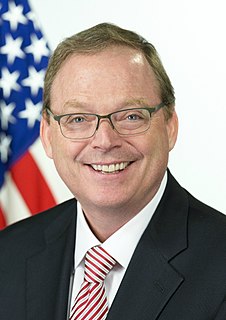Top 27 Quotes & Sayings by Kevin Hassett
Explore popular quotes and sayings by an American economist Kevin Hassett.
Last updated on April 16, 2025.
There is no tax policy that better describes how out of touch America's liberals are with the rest of the country than the estate tax. According to the Left, government seizure of a large share of the wealth of an American taxpayer is a moral imperative that serves social justice. Most Americans disagree, big time.
For an American, as mad you may be about whatever the EPA or the IRS does, just imagine if you only had a one twenty-eighth vote over what it does. You were in this place with this big bureaucracy that sets rules, and you only have a small vote. You'd feel like you've given up your sovereignty, wouldn't you?
I think that one of the things that we have to recognize is that the longer somebody doesn't have a job, the harder it is to get a new job. You know, the reality is that if you're out of job, and you're looking for a job, then the new employer's going to say, 'Well, why, you know, don't you have a job now? What's wrong with you?'
Socialized medicine allows a nation to exclude a U.S. product from its market if the U.S. firm does not make generous enough price concessions. Accordingly, what has developed is a system within which U.S. firms make large profits on new drugs in the U.S. market, but very low profits on sales everywhere else.
Given the importance of Washington, outsiders probably have an unrealistic perspective on how large the city is. The fact is, Washington D.C. is a small town, and most everyone knows most everyone else. That person of the other party who you despise will someday be at your daughter's birthday party.





















